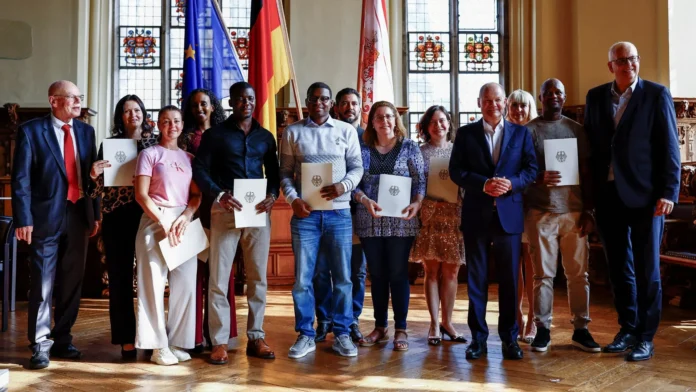Germany granted citizenship to a record 291,955 people in 2024, marking a 46 percent increase from the previous year, according to data released by the Federal Statistics Office on Tuesday. The unprecedented spike is largely attributed to reforms in naturalization laws and a surge in applications from Syrian nationals.
Syrians made up the largest group of new German citizens, accounting for 28 percent, or 83,150 people, of all naturalizations, a 10.1 percent increase from 2023. Many of them arrived in Germany during the 2015–2016 refugee wave, when then-Chancellor Angela Merkel opened the country’s borders to those fleeing war and persecution in the Middle East. After years of residence, many became eligible under relaxed requirements introduced in mid-2023.
Under the revised citizenship law, Germany reduced the minimum residency requirement from eight years to five, and to three years in exceptional cases. The reform also permits applicants to retain their original nationality, a provision that notably benefited Turkish citizens, many of whom or whose families came as guest workers decades ago. The number of Turkish nationals naturalized more than doubled in 2024, reaching 22,525.
Other significant groups included Iraqis (5%), Russians (4%), and Afghans (3%). Russians saw the largest year-on-year percentage increase in naturalizations, rising sharply from 1,995 in 2023 to 12,980 in 2024, a sixfold jump likely influenced by geopolitical tensions and internal conditions in Russia.
Despite the record figures, Germany’s new coalition government, comprising conservatives and Social Democrats, has expressed intentions to reverse parts of the liberalized policy. Plans are underway to reinstate a minimum five-year waiting period for naturalization, arguing that citizenship should come as the culmination of integration, not as its starting point.
Critics of the reforms warn that shorter paths to citizenship could increase migration pressure and stir domestic backlash, while supporters argue that inclusive policies strengthen social cohesion and reflect the realities of modern Germany’s diverse population.
The debate continues as Germany grapples with balancing integration, demographic challenges, and political sentiment in a changing social landscape.
Written By Rodney Mbua



















